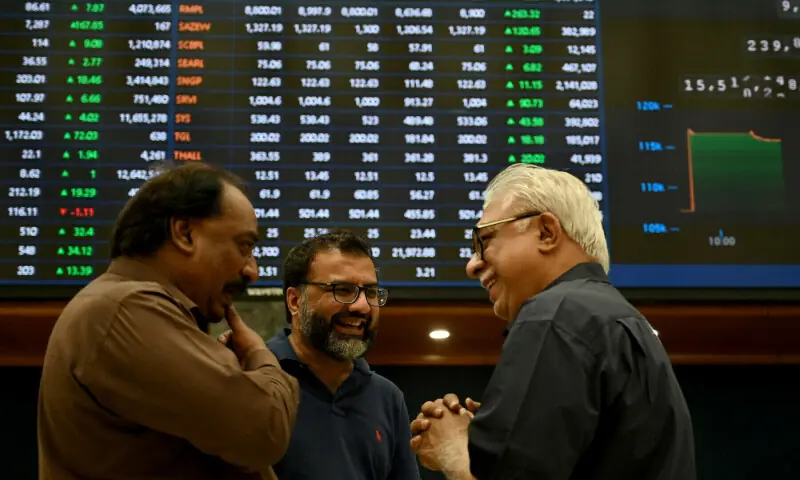KARACHI: The Pakistan stock market recorded historic gains in the outgoing week, buoyed by a series of geopolitical and economic developments that have bolstered investor confidence. The KSE-100 index crossed the 162,000-point threshold for the first time, driven largely by the US-Pakistan leadership meeting, a landmark circular debt agreement, and progress on external account support from Gulf countries.
The market gained 2.7 per cent week-on-week, with the index closing at 162,257 points. Average daily traded volume increased to 1.67 billion shares, with a daily average traded value of Rs60bn. Key drivers included the signing of a Rs1.275tr financing facility with 18 commercial banks to address the power sector’s circular debt, and a strategic defence agreement with Saudi Arabia that raised hopes of enhanced bilateral trade and financial support.
Prime Minister Shehbaz Sharif’s meeting with US President Donald Trump on Sept 25 at the White House reinforced expectations of stronger diplomatic and economic ties. This followed a recent visit by a high-level US delegation focused on critical minerals and infrastructure investment, with memoranda of understanding signed on the development of rare earth elements.
The power sector circular debt, a long-standing challenge, stood at Rs1.6tr as of July 25, down from Rs2.3tr the previous year but still rising year-to-date by Rs47bn. The recent agreement paves the way for a Rs1.225tr loan from banks at Kibor minus 0.9pc, which analysts expect will improve liquidity and stability in the sector.
Index closes outgoing week above 162,000 points, supported by US-Pakistan ties, Rs1.2tr circular debt deal
Pakistan’s foreign exchange reserves improved slightly, rising by $58m week-on-week to $19.79bn, with State Bank of Pakistan (SBP) reserves increasing to $14.38bn. The Pakistani rupee appreciated marginally by 0.03pc against the US dollar, closing at Rs281.37.
In the energy sector, crude oil imports declined 16.3pc year-on-year in August, reflecting lower global oil prices and reduced import volumes, while petroleum product imports rose 3.8pc.
Oil production increased 2.7pc week-on-week to 64,313 barrels per day, driven by higher output from fields including Pasakhi and Maramzai. Gas production also rose by 2.8pc to 2,812m cubic feet per day, supported by increased flows from Sui and Makori East.
Sector-wise, exploration and production (E&P) and power stocks were among the strongest performers, contributing 1,084 and 888 points respectively to the index, with commercial banks adding 955 points. Fertiliser sales surged in August, with urea and DAP offtakes rising 46pc and 53pc year-on-year, supported by discounts and inventory management.
Market sentiment remained positive, with analysts highlighting the circular debt resolution agreement as a key milestone. Arif Habib Ltd noted the KSE-100’s forward price-to-earnings ratio at 8.52x for 2026, close to its 15-year average of 8.59x, offering a dividend yield of approximately 6.2pc, slightly above its historical average.
AKD Securities reported an all-time high weekly average traded volume of 2.2bn shares, a 20pc increase week-on-week, signalling rising market participation. They forecast the market will continue its upward trajectory, targeting 165,215 points by December, driven by strong earnings in fertilisers, steady returns in banks, and improving cash flows in exploration and production as well as oil marketing companies, supported by falling interest rates and economic stability.
Despite these gains, challenges remain. The International Monetary Fund (IMF) has pressed Pakistan on missed tax targets and pending court cases. The government announced a 10pc cut in power tariffs following the debt repayment agreement.
Additionally, Japan has expressed interest in investing in the Reko Diq mining project, while Pakistan seeks unilateral tariff concessions from China on 700 items. The Federal Board of Revenue clarified that there is no proposal for a mini-budget.
On the equity front, top gainers included K-Electric (up 23.8pc), Bestway Cement (17.6pc), Hub Power (12.7pc), DG Khan Cement (11pc), and Mari Energies (9.9pc). Meanwhile, Tariq Glass Industries, Engro Polymer & Chemicals, Punjab Oil Mills, Pakgen Power, and Bannu Woollen Mills were among the laggards, posting declines between 5.9pc and 7.4pc.
Net buying was recorded by mutual funds and individual investors, with net inflows of USD 35.6m and USD 6.7m, respectively, while banks and foreign investors were net sellers, offloading USD 15.8m and USD 13.7m, respectively.
The week’s developments indicate cautious optimism among investors as Pakistan navigates complex political and economic challenges, with the upcoming IMF review expected to remain a focal point in determining the market’s direction.
Published in Dawn, September 28th, 2025
